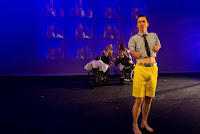 |
| 'Capital Crawl,' Tom Olin, from 'Art of the Lived Experience' |
Editorial: RDS Volume 11, Issue 2
Who has the right to say what the body means? This is one of the questions those concerned with the power of media – and of access to media – frequently consider. The multiple forms of media (traditional and new) that we experience can have a profound influence on how we consider the body. Those myriad voices frequently dictate (or try to dictate) what we as communities believe it means to be beautiful, what it means to be a man, what it means to be a woman, what it means to be “normal,” even what it means to be human. Increasingly democratic possibilities of new media and media distribution have given forum to many new voices to give their own take on these questions. There have increasingly been more ways to expand and interrogate sacred notions of the body, whether the sacred cultural scripts of gender, race, or those of what it means to have a disability.
 |
| Mat Fraser in 'In Water I'm Weightless' |
Many of these voices--like
Liz Crow,
Mat Fraser, or the work of
Art of the Lived Experience and many others, in film, in performance, in music, and other media forms take up the task of challenging dominant notions of what the body means and who gets to have a say. These voices frequently tell their own stories, invite audiences to share and question their own, and--sometimes directly, sometimes indirectly--invite us to imagine new stories yet untold, yet unlived, about what the body can mean, what a true community can be, free of labels, free of the nervous politics of borders that anxiously medicate, discriminate and attempt to order the delicate, indescribable beauty and pain of being who we are.
 |
| Liz Crow in 'Bedding Out" |
For those of you reading this now who may have visual, audio and other multimedia work that engage these important questions, you are invited to submit work to the
Review of Disability Studies to continue the conversation with an international audience made up of scholars, laypeople and other interested people. Works may include digital film, sound files, or artist statements, or other experimental forms. Special attention will be given to those works that give unique, embodied exploration/interrogation of the contradictions of what disability is/is not, and fiercely claim their own right to decide the answer.
Aloha,
Raphael Raphael
Athens, Greece
May 20th, 2015
rraphael@hawaii.edu
Be sure to
subscribe so you can view the most current issue of RDS
Volume 11, Issue 2.






No comments:
Post a Comment